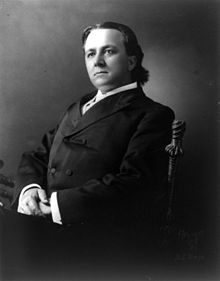James Kimble Vardaman
| James K. Vardaman | |
|---|---|
 |
|
|
United States Senator from Mississippi |
|
|
In office March 4, 1913 – March 3, 1919 |
|
| Preceded by | Le Roy Percy |
| Succeeded by | Byron P. Harrison |
| 36th Governor of Mississippi | |
|
In office January 19, 1904 – January 21, 1908 |
|
| Lieutenant | John Prentiss Carter |
| Preceded by | Andrew H. Longino |
| Succeeded by | Edmond Favor Noel |
| Member of the Mississippi House of Representatives | |
|
In office 1890-1896 |
|
| Personal details | |
| Born |
James Kimble Vardaman July 26, 1861 Jackson County, Texas, C.S. |
| Died | June 25, 1930 (aged 68) Birmingham, Alabama, U.S. |
| Resting place | Lakewood Memorial Park, Jackson, Mississippi, U.S. |
| Political party | Democratic |
| Spouse(s) | Anna Burleson Robinson |
| Military service | |
| Nickname(s) | "The Great White Chief" |
| Allegiance |
|
| Service/branch |
|
| Rank |
|
| Battles/wars | Spanish–American War |
James Kimble Vardaman (July 26, 1861 – June 25, 1930) was an American politician from the U.S. state of Mississippi and was the Governor of Mississippi from 1904 to 1908. A Democrat, Vardaman was elected in 1912 to the United States Senate in the first popular vote for the office, following adoption of the 17th Amendment. He defeated incumbent LeRoy Percy, a member of the planter elite. Vardaman served from 1913 to 1919.
Known as "The Great White Chief", Vardaman had gained electoral support for his advocacy of populism and white supremacy, saying: "If it is necessary every Negro in the state will be lynched; it will be done to maintain white supremacy." He appealed to the poorer whites, yeomen farmers and factory workers.
Vardaman was born in Jackson County, Texas in July 1861. He moved to Mississippi, where he studied law and passed the bar. He settled in Greenwood, Mississippi, becoming editor of The Greenwood Commonwealth. This newspaper is still in publication as of 2015.
Mississippi election campaigns were frequently marked by violence and fraud after Reconstruction. A biracial coalition of Republicans and Populists had briefly controlled the governorship and Mississippi House in the late 1880s.
As a Democrat, Vardaman served in the Mississippi House of Representatives from 1890 to 1896 and was elected as speaker of that body in 1894. He was known for his populist appeal to the common man. The Democrats took action to ensure they did not lose power again in the state. After having gained control of the legislature by suppressing the black vote, they passed a new constitution in 1890 with provisions, such as a poll tax and literacy test, that raised barriers to voter registration and in practice disenfranchised most blacks.
...
Wikipedia
